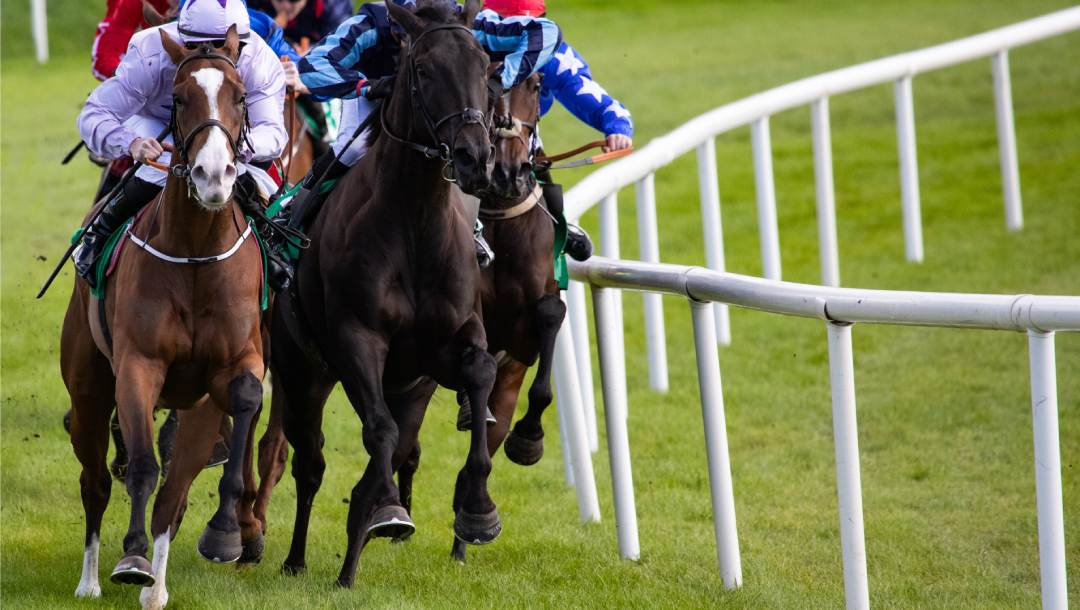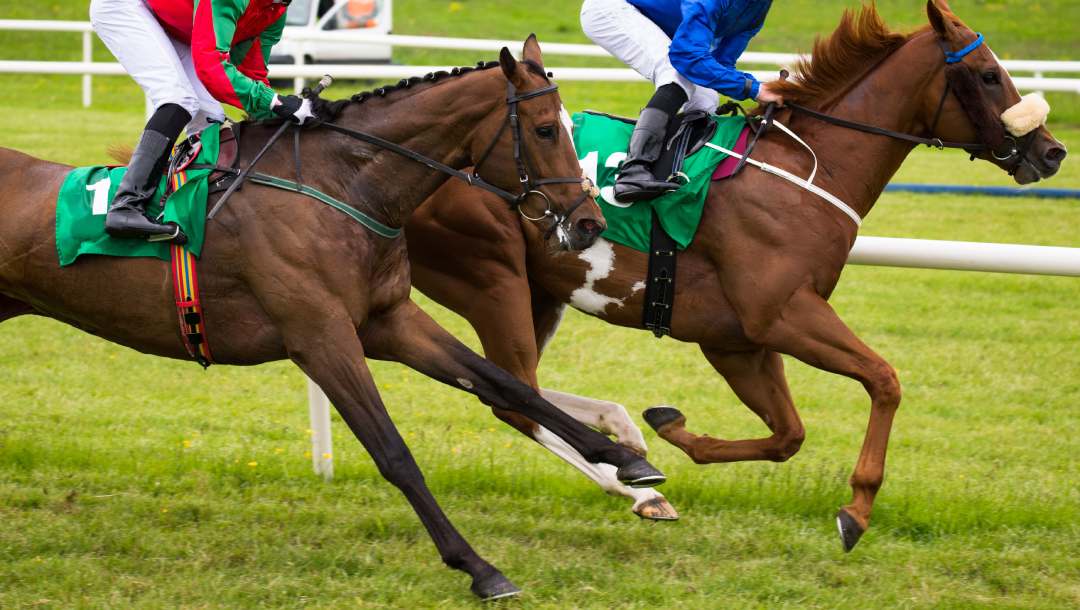Dirt tracks may dominate the American horse racing scene, but turf tracks are still the most popular race tracks in the rest of the world. As a bettor, you may wonder what the difference between turf and dirt tracks is and how it affects your online sports betting. We’re here to answer all your turf racing questions and to show you how to identify a horse with the best chance of winning.
What are turf and dirt race tracks?
The dirt race tracks in Triple Crown Races in the US are made from a mixture of dirt, sand, clay and soil. Dirt track races are usually quicker, with horses running at a consistent speed. While these tracks are inexpensive and easier to maintain compared to turf and synthetic tracks, they can be more strenuous on horses and more susceptible to weather conditions such as rain.
Turf tracks are made of natural grass. While they only account for 20% of race tracks in North America, they are the most prominent kind of race track in other countries such as Australia, the United Kingdom and France. Turf tracks are considered the safer option because they provide better shock absorption for horses and better adhesion to the ground.
Turf races are not paced in the same way as dirt races. They usually take longer, with horses at first maintaining a steady speed only to shoot forward towards the end to claim the lead. The horse needs to know when to shoot forward and sprint and how to control its speed. As a result, jockeys play a much more significant role in turf races than in their speedy dirt counterparts.
Does turf betting matter in America?

Why should you care about racing horse turf and tracks when you’re in a country that predominantly has dirt tracks? Well, even though most American races take place on dirt tracks, learning how to bet on horse races on turf tracks can give you an edge in your live betting.
Turf races are rare in the US and most people have little or no knowledge of how to analyze and bet on them. Bettors can use this to their advantage because if you take the time to learn about turf betting and how to handicap turf races, it can become a very profitable niche betting market for you. So, how do you find a winner in a turf horse race?
How to find a winning horse in turf track races
Reading our guide on dirt track betting, you may be forgiven for thinking that the speed of a horse is the most critical factor to consider in your horse race betting. However, a different track creates a different race. It’s difficult to sprint through an entire race on turf. Speeds in turf races are inconsistent, with a slow and steady start and a sprint finish. Speed alone does not make for a winner on turf; instead, other factors, such as the jockey or the horse’s physique, is a priority. Here are some important factors you should consider when betting on turf racing.
The jockey
If speed is of paramount importance in dirt races, then the jockey certainly assumes that importance in a turf race. Turf races are all about saving ground and being ready to strike and sprint in the final moments of the race. This requires controlled movement and precise timing, something that only the jockey can bring to the race.
Jockeys understand the speed their horse can maintain for the long stretch at the beginning of a race. They know how to conserve their horse’s energy until it’s time to sprint. Their communication skills will help a runner pace itself and signal when it’s time to bolt into the lead.
Jockey history
Turf races require better communication between horse and jockey. When doing your research, look at the jockey’s history with the horse to see if there’s a strong connection. Also, look at the jockey’s performance history in other turf races. A good jockey can push a seemingly mediocre horse into the lead. If the jockey has a history of placement in the top three, even a horse that hasn’t placed before has a chance of winning if that jockey were to direct them.
Horse endurance
Turf races are usually longer than dirt races. This is why a horse needs endurance. Look at the horse’s previous races over longer distances to see how they performed and if they slowed down at the end of the race due to fatigue. A horse with endurance will have lots of experience on long turf tracks and come from a trainer with a track record of training horses for long distances.
Horse hooves and build
Turf tracks are much softer than dirt tracks. For turf races, a horse’s hooves should be larger so that they can stay on top of the soil instead of digging into it. This will enhance speed and traction. That said, it’s not exactly easy to examine a horse’s hooves before you bet on a race. Instead, you can use the horse’s turf racing history to see how the horse performed on similar tracks in the past. If its win percentage on turf tracks is 20% or higher, that means the horse has the appropriate build for turf races.
Horse pedigree
Pedigree is particularly important when you want to bet on a horse without a racing history. Turf races require specific physical attributes, meaning horse genetics can provide helpful insights. Some sires are known to have strengths suited to turf races. If you’re betting on a newbie, check to see if the horse is one of the grandchildren of sires such as Kitten’s Joy, Langfuhr, Giant’s Causeway or Scat Daddy.
Turf conditions vary according to weather and quality of maintenance, and you can’t predict how fast or slow a race will be. The main predictable factors are track length and if the horse will have enough stamina for the final sprint. A horse’s pedigree and class should have much more influence on your decision than their speed.
Track conditions

Like dirt tracks, turf conditions have a track bias that can affect a horse’s performance. When you’re betting, check weather conditions because that will impact the state of the race track. Ideal turf conditions favor horses with strong bodies and endurance. However, in dry conditions, the track can be hard and taxing on joints, in which case a lighter, taller horse will perform better.
In very wet or muddy track conditions, horses need a lot of power to drive through the mud. In such conditions, a stronger horse will have the advantage. Heavier, taller horses have the upper hand on turf tracks with long grass.
The trainer
The best trainers know what kind of body a horse needs to succeed in turf races. They know how to train their horses so they can power through the muddiest turf tracks. These trainers use similar methods to train their horses, meaning that if a trainer’s other runners perform well on turf tracks under tough conditions, other horses from the same stable will likely be trained to do the same.
What’s your verdict? Did your favorite thoroughbred runner pass our turf racing checklist? If so, then you’re ready to bet on horse races online with BetMGM.
Experience the thrill of sports betting with BetMGM
There’s no better place to start your horse race betting journey than with the best sportsbook in the industry. The BetMGM sportsbook offers the best odds, betting options and a wide range of major sporting events to bet on. Create an account to back your favorite horse in the next turf race.










